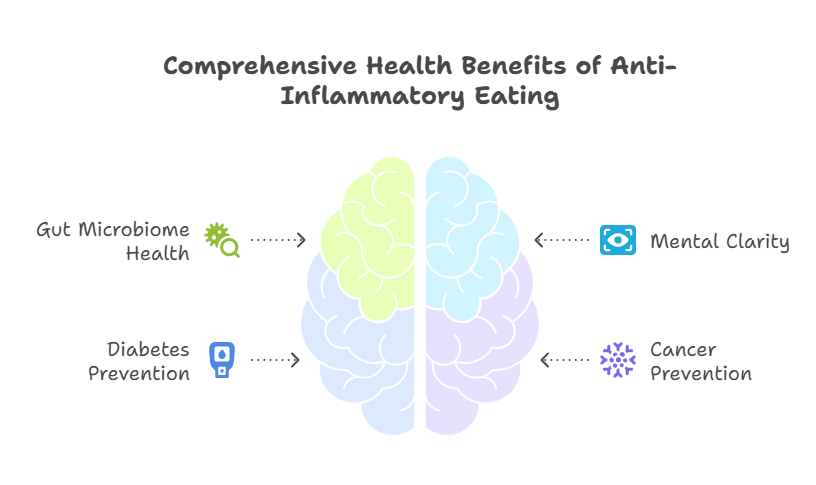Adopting an anti-inflammatory eating pattern offers more than just a healthy plate; it’s a powerful tool for enhancing your overall well-being. By consistently choosing foods that calm inflammation, you can unlock a range of significant health advantages.
Reduces Chronic Pain and Arthritis
If you’ve ever wondered whether food could truly ease chronic pain, the answer might surprise you. Consider Sarah, a 52-year-old teacher who struggled with rheumatoid arthritis for years. After switching to an anti-inflammatory diet rich in wild-caught salmon, vibrant berries, and leafy greens, she noticed her morning stiffness gradually melting away.
The science behind this transformation is compelling. Chronic inflammation acts like an overenthusiastic security system, creating painful swelling and stiffness in joints affected by arthritis. When you consistently consume omega-3 fatty acids from sources like salmon, mackerel, and walnuts, along with powerful antioxidants found in colorful fruits and vegetables, you’re essentially sending your body’s inflammatory response a “calm down” message.
These nutrients work by reducing inflammatory markers such as C-reactive protein and interleukin-6 in your bloodstream. The result? Less joint swelling, reduced stiffness, and a significant decrease in the persistent pain that may have been your unwelcome daily companion. Many people report noticeable improvements within just a few weeks of making these dietary changes.
Supports Robust Heart Health
This dietary approach is a formidable ally for your cardiovascular system. By discouraging processed foods high in unhealthy fats and sodium, and promoting fiber-rich whole grains, lean proteins, and healthy fats like those in olive oil and avocados, it helps to:
- Lower blood pressure
- Reduce LDL (“bad”) cholesterol and triglycerides
- Decrease the risk of plaque buildup in arteries (atherosclerosis)
These effects work in concert to significantly lower your risk of heart disease, heart attacks, and strokes.
Your Heart’s Best Friend Lives in Your Kitchen

Your cardiovascular system tells a story with every heartbeat, and an anti-inflammatory diet helps ensure it’s a long, healthy tale. Think of your arteries as highways that need to stay clear for optimal traffic flow. Processed foods laden with trans fats, excessive sodium, and refined sugars are like creating roadblocks and debris on these vital pathways.
When you choose nutrient-dense whole foods instead, you’re essentially becoming your heart’s personal maintenance crew. Fiber-rich oats and quinoa help sweep cholesterol from your system like a gentle broom. The monounsaturated fats in extra virgin olive oil and creamy avocados work to lower your LDL (“bad”) cholesterol while maintaining healthy HDL levels. Meanwhile, the potassium in bananas and spinach helps regulate blood pressure naturally.
The Mediterranean populations have demonstrated this principle beautifully for generations. In regions where people regularly consume olive oil, fish, nuts, and abundant fresh produce, rates of heart disease remain remarkably low. Their traditional eating patterns have become a blueprint for cardiovascular health, showing us that delicious food and heart protection can go hand in hand.
This dietary approach doesn’t just prevent problems—it actively reverses damage. Studies have shown that people following anti-inflammatory eating patterns can reduce their risk of heart attacks by up to 30% and significantly lower their chances of stroke. Your arteries actually become more flexible and resilient, like well-maintained rubber bands rather than stiff, brittle pipes.
Sustained Energy That Doesn’t Crash and Burn

Remember the last time you felt truly energetic all day long, without that afternoon slump or the need for multiple coffee refills? An anti-inflammatory diet can restore that natural vitality by transforming how your body processes and uses fuel.
The typical Western diet creates an exhausting roller coaster ride for your blood sugar. Refined carbohydrates and sugary snacks cause rapid spikes in glucose, followed by inevitable crashes that leave you feeling depleted and craving more quick fixes. It’s like trying to fuel a car with newspaper instead of gasoline—you might get a brief burst, but you’ll quickly sputter to a halt.
Anti-inflammatory foods work differently. Complex carbohydrates from sweet potatoes, steel-cut oats, and legumes release energy slowly and steadily, like a time-release vitamin for your metabolism. The healthy fats from nuts, seeds, and fish provide sustained fuel that keeps your brain sharp and your energy levels stable. Antioxidant-rich foods like blueberries and dark chocolate (yes, dark chocolate!) protect your cells from the oxidative stress that contributes to fatigue.
Many people discover that within two weeks of adopting this eating style, they no longer experience the dreaded 3 PM energy crash. Instead of reaching for another cup of coffee or sugary snack, they maintain steady focus and alertness throughout the day.
The Ripple Effects: Benefits Beyond the Obvious

The beauty of anti-inflammatory eating lies in its comprehensive impact on your health. Like dropping a pebble in a still pond, the benefits ripple outward in ways you might not expect.
Your gut microbiome—the trillions of bacteria living in your digestive system—thrives on the diverse fiber found in anti-inflammatory foods. A healthy gut doesn’t just improve digestion; it’s increasingly linked to better mood regulation, stronger immune function, and even clearer thinking. Some researchers call the gut our “second brain” because of its profound influence on mental health.
Speaking of mental clarity, the omega-3 fatty acids and antioxidants in this eating pattern are like premium fuel for your brain. They support the production of neurotransmitters that regulate mood and help protect against age-related cognitive decline. Many people report feeling more mentally sharp and emotionally balanced within weeks of making these dietary changes.
The protective effects extend to reducing your risk of type 2 diabetes by improving insulin sensitivity, and research suggests certain anti-inflammatory foods may help prevent various types of cancer by reducing cellular damage and supporting your body’s natural detoxification processes.
Making It Deliciously Sustainable
The most powerful aspect of anti-inflammatory eating isn’t just its health benefits—it’s how satisfying and enjoyable it can be. This isn’t about deprivation or bland “health food.” It’s about discovering the incredible flavors that come from fresh herbs, quality olive oil, perfectly ripe produce, and skillfully prepared whole foods.
Imagine starting your day with creamy Greek yogurt topped with antioxidant-rich berries and crunchy walnuts, enjoying a lunch of wild salmon with roasted vegetables drizzled in herb-infused olive oil, and ending with a dinner of lentil curry fragrant with turmeric and ginger. These aren’t sacrifices—they’re celebrations of flavor that happen to be profoundly nourishing.
The journey toward better health through anti-inflammatory eating begins with a single meal, a single choice. Each time you select whole foods over processed ones, each time you choose colorful produce over beige alternatives, you’re casting a vote for your long-term vitality and well-being. Your future self—more energetic, less painful, and vibrantly healthy—is waiting to thank you.






